Text
Advice Given to Muawiyah By Aisha (ra)
Aisha reported: The Messenger of Allah, peace and blessings be upon him, said, “Whoever seeks the pleasure of Allah by the displeasure of people, Allah will suffice him against the people. Whoever seeks the pleasure of people by the displeasure of Allah, Allah will leave him to the patronage of people.”
6 notes
·
View notes
Text
Surah Al-Ankabut Verses 20-24: Thoughts
Travel through the world to contemplate the signs of Allah (sw). We can't escape God, no matter where we go.
Those who disbelieve are those who don't have hope in Allah's mercy. Kufr- coming from "kafara," which means "to cover"- is a result of arrogance. Arrogance covers up the feeling of hopelessness in ourselves and in God.
Humility is associated with viewing the self as a person of worth and appreciating humility in others. Arrogance is a defense system built to conceal negative self-talk and hopelessness. Often, people develop a 'voice' that barrages the core self; they divide themselves in parts and don't accept who they are, which indirectly means rejecting God.
Self-consciousness is because of the Ruh of Allah (sw)- Al-Khabeer- the source of awareness. Humility to God results in positive views of the self.
Our beliefs, dictated by our thoughts, make our reality. When we believe that we have infinite potential because of God, then, through God, we have it. When Ibraheem was thrown into the fire, it didn't burn him because he believed in God. Miracles are simply drawing closer to reality. Accepting God means accepting strength and control; he didn't want to burn, so the fire did not burn through the strength and control of Allah (sw), which Ibraheem accepted and manifested.
#quran#Islamic#Surah-Alankabut#Thoughts#Humility#belief#God#ProphetIbraheem#Islamicreminders#Kufr#Quran
0 notes
Text
وَإِن مِّن شَىْءٍ إِلَّا عِندَنَا خَزَآئِنُهُۥ وَمَا نُنَزِّلُهُۥٓ إِلَّا بِقَدَرٍ مَّعْلُومٍ
(Surah Hijr 21)
Qadr is a sign of God.
Time is a means of witnessing Qadr.
Time is perceived only in relation to matter/substance.
1 note
·
View note
Text
Bashar- بشر
This means "person," and connotates the physical aspects of a human being because bashara also means "skin."
Bishara- بشارة
This means "glad tidings" and bashar also means "good news."
Human beings are linguistically linked to being the bringer of glad tidings. This is because of the way they are conscious of God's existence. In simply being, a human is bringing the good news of God's existence.
0 notes
Text
If God is loving, why does He allow for Iblees to go astray?
Surah Isra, verse 82. "And we send down from the Quran that which is a healing and mercy to those who believe."
Everything in the world is an ayah- signs of existence, signs of Allah (sw). The Quran is a mercy because it further clarifies the existence of God with its verses. It delineates stories and points to "Amthal," examples, in the world for us to learn from. This includes the story of Iblees.
All the angels prostrated to Adam (as) except Iblees, because of arrogance in his heart.
Arrogance is the seedling of separation from Allah (sw). It builds a barrier between creation and the Creator, because the creation thinks it is worthy of being separate from the Creator.
Surah Hijr, verse 31. "except Iblis; he refused to join those who prostrated."
This story of Iblees is also an ayah for the people who believe. The Shayateen, which are not constricted to only being Jinn, are signs. The bad repercussions of following the footsteps of Shaytan are clear signs for the believers.
If Allah did not allow for the story of Iblees to happen, then we would never be able to truly learn about God in the way He wants, nor would submitting to His will be anything to consider if everything we knew about creation and God was closeness to God. What does it mean to be far from God? God gives us stories and examples as a mercy. Iblees and His denial is an example for us, a reminder, a warning. Some even believe Iblees to be a manifestation of God's great power.
Regardless, the moral of the story is a powerful one. It even addresses one of the problematic issues afflicting humanity, an inherently evil and destructive belief: racism.
If God did not inform us of it, then on the Day of Judgment, humans would argue that God's proofs were not enough. But instead, we are given different ayat to contemplate on.
Surah Nisa, verse 82. "Do they not contemplate the Qur'an (so that they may be convinced that it is from God)? Had it been from any other than God, they would surely have found in it much (incoherence or) inconsistency."
All the stories of the prophets and nations punished before are also ayat for the people who contemplate on the Quran's verses.
Surah Fussilat, verse 15. "As for 'Aad, they were arrogant upon the earth without right and said, "Who is greater than us in strength?" Did they not consider that Allah who created them was greater than them in strength? But they were rejecting Our signs."
To submit to God, is to submit fully to His will. This includes accepting and learning from the stories He gave us, so we can grow closer to Him in the exact way He wants.
And in the end, God is the Most Forgiving and the Most Merciful.
#islam#islamic#ninetyninenames#quran#quranic#thoughts#iblees#mercy#divinenames#contemplation#ayat#signs#believers#God
0 notes
Text
This is a beautiful article about the meaning of Al-Latif, the most kind. Because of Allah's (saw) complete knowledge of everything in the world, His kindness manifests in a gentle and subtle way to His creation. Understanding the true meaning of this name means understanding how no one is truly kind; only Allah (saw) is.
#al-latif#ninetyninenames#islamic#islam#yaqeeninstitute#Allah'snames#Asmaulhusna#article#beautiful#islamicresearch
2 notes
·
View notes
Text

A letter sent to a college friend ^^
Am I the only one nervous for returning to in-person classes ?
16 notes
·
View notes
Text
Ten Days of Dhul Hijjah
Taking advantage of the blessed ten days of Dhul Hijjah is important. Here are some points to consider:
1. Recitation of Fajr
- there is barakah in worshipping Allah (swt) in the early morning time.
2. Praying in the night, specifically before Fajr
- that is the most blessed time of the night
- night worship has a distinct level of secrecy and sincerity
3. Commemorating and growing closer to the stories of Prophet Musa and Prophet Ibraheem (ra)
- take time out of your day to learn about the prophets and the historical significance of these days
4. Fasting mode
- approach these days with the mindset of a fasting person
- be careful with your words; be gentler with others
5. All five pillars of Islam are emphasized at this time of the year, which makes it more special.
- Hajj is legislated at this time; prayer, charity, fasting, and voluntary good deeds should increase.
Hadeeth: Ibn Abbas reported: The Prophet, peace and blessings be upon him, said, “No deeds are more pure to Allah Almighty, nor greater in reward, than good deeds performed in the ten days of the month of sacrificing.”
Allow yourself some time for disconnection and seclusion during these days.
May Allah accept our prayers <3
4 notes
·
View notes
Text

Isn't it nice to have someone to be,
missed by and someone who misses me? ~
16 notes
·
View notes
Text

Al-Aziz - meaning the most powerful and strong, this name is mentioned multiple times in the Quran such as verse 6 of Surah Imran: "He is the One Who shapes you in the wombs of your mothers as He wills. There is no god ˹worthy of worship˺ except Him—the Almighty, All-Wise."
#islam#ninetyninenames#journaling#journal#aesthetic#ninetyninenamesofAllah#Asmaulhusna#purple#photocard#Quran#washitape#idunno
10 notes
·
View notes
Photo

Ramadan is coming soon, which means time to make Ramadan greeting cards. Doesn’t time fly too fast?
2 notes
·
View notes
Text
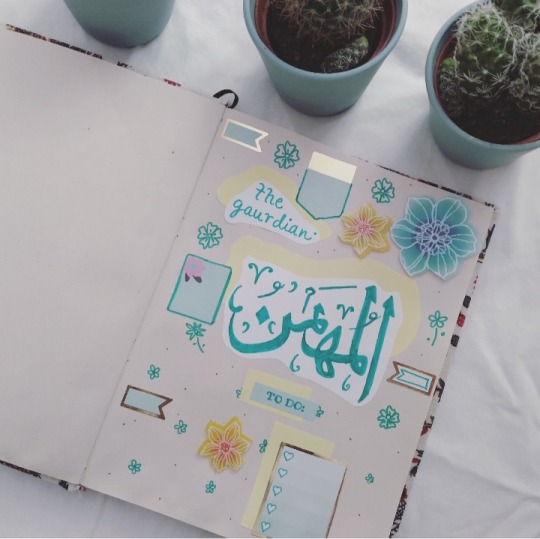
Al-Muhaymin: Allah is our guardian, our protector, the one who oversees everything. When you are stuck in a fearful situation, remember that Allah is the one that can grant you ease, refuge, and safety. There are thousands of calamities that can strike you in this very second, but the Earth continues in its undisturbed, meditating rotation as Allah wills, giving meaning and purpose to everything that lives on it. In every difficulty, there is always a beam of hope, like the flowers that find their way through the cracks of cement to bloom. It's okay to be scared sometimes, it's okay to falter and stumble. But never forget that the Creator of fear is the one that will protect you and give you courage, the one who is closer to you than your jugular vein.
#blue aesthetic#almuhaymin#Ninetyninenames#artsy things#islamic#love#asmaulhusna#journaling#bullet journal
1 note
·
View note
Photo
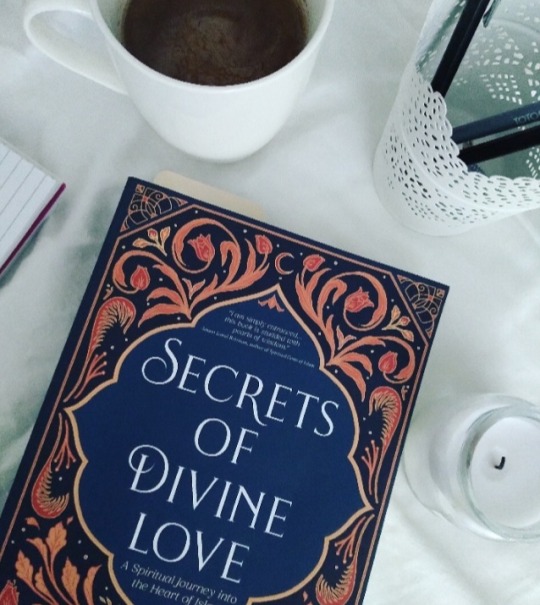
“Our experience of the world has little to do with what happens to us and everything to do with how we subconsciously or consciously choose to interpret our experiences.”
3 notes
·
View notes
Photo
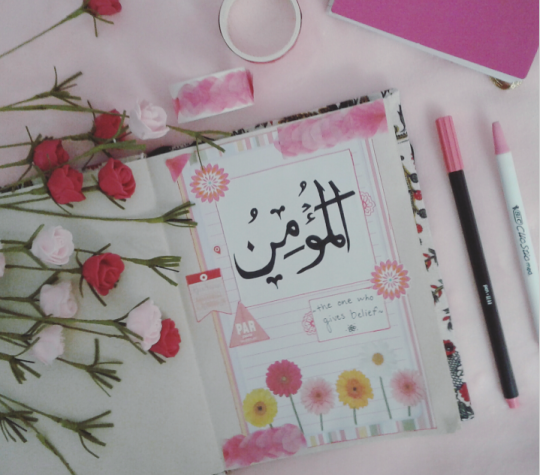
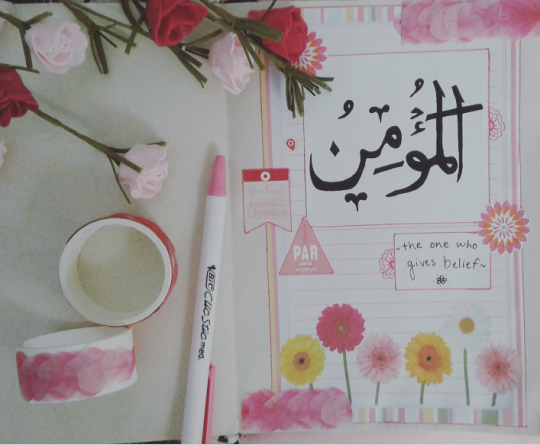
Al-Mu’min: the source of faith and security, the one who grants tranquility and the light of faith. Found in surah Hashr verse 23. Only by His will and mercy are hearts inspired to faith and He is the one that affirms the faith of the believers.
1 note
·
View note
Photo
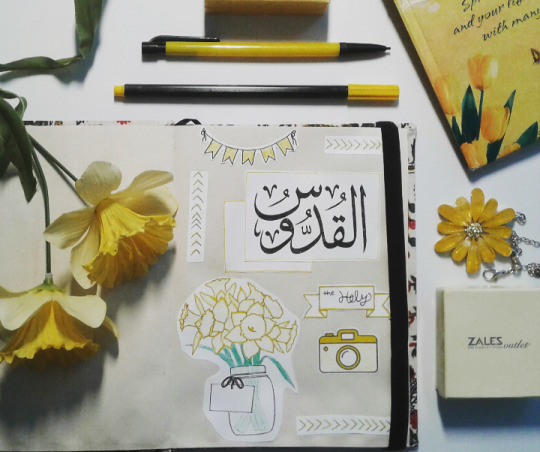
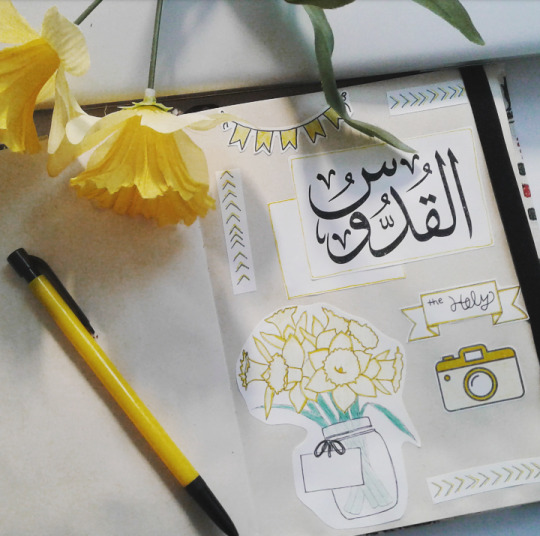
Al-Qudoos - the holy one, the purest, above the perception and concept of creation, a name that is reserved only for Allah (swt). Allah is most perfect and has no flaws or shortcomings, and does not do injustice to anyone. This name is mentioned twice in the Quran in Surahs Al-Jumua’ah and Al-Hashr.
13 notes
·
View notes
Photo

“Self-care” is an expression we often see being used. Starting as a medical term coined in the 1950′s for mentally ill patients, it became a concept borrowed for political reasons by women in the civil rights movement, before moving to San Francisco bay where the public’s attention drew towards a holistic approach to fitness and healthy life style. Today, the term is used more than ever as a way to tell a person to take emotional breaks, to overcome compassion fatigue, burnout and others. While the concept of taking care of yourself physically and emotionally is beyond important, it’s not exactly a concept we should be throwing around easily either. Especially when constantly using it as an excuse to isolate yourself from people that care for you.
The prophet (saw) suffered countless human loss in his life but had the capacity to listen to a bird complain about its nest, and a cat complain about its treatment. After burying over six children and many other loved ones, he was still able to smile. He even felt a deep connection and love for people he never met... us. Yes, he is a prophet, sent as a mercy to humanity, but even so, he was also sent as an example, as a human - just like us. How did he manage to stay strong without resorting to depending on the tactics of self-care that we generally turn to?
First, his escape route was prayer. And while no one can match his level of focus and devotion during prayer, we can still learn from it and perceive the importance of inherently depending on prayer in our daily lives. And this route never made him ignorant of the problems faced by everyone around him. Instead, it enabled him to become more involved physically and emotionally with his surroundings. It made him stronger. At the same time, the five daily prayers are structured in a way to balance our work and spiritual matters in life. They serve as necessary frequent breaks between the day and give us time to find tranquility in the moment. It’s a form of self-care that is constant, an essential ingredient in the recipe of every single day of our lives.
A part of prayer is making dua’a. This includes changing our mindset about our personal goals and the world around us. For example, a dua’a found in Surah Furqan ayah 74 is, “Oh my Lord, make our spouses and children a comfort to our eyes and make us leaders of the virtuous.” This journey in life is not just about ourselves; it’s also about the people around us. Taking care of our family, neighbors, friends is our responsibility -- not just a means of doing good deeds to make us feel better about ourselves. We have a greater purpose in life, and every single person is accountable. Asking God for help is a perfect starting point to making us fulfill this purpose with the capacity that we have. We should always ask the question, “how can I get myself to a place where I am able to take care both of myself and others?” Self-care is only one miniscule step in a long, worthwhile, journey of actively taking care of the people around us.
Another important point to digest is that ‘isolation’ from people is actually not inherently bad. On the contrary, the prophet used to isolate himself during the night time to organize his thoughts, especially before prophethood, and this brought him a lot of benefit. A healthy lifestyle, spending time outside (i.e playing sports), breathing in nature, silence, reading, and spending time alone are crucial to our well-being. Especially as work of school assignments pile up on out desks, it’s hard to stay focused constantly. These intervals are necessary to our livelihood, programmed inside of us. We yearn for love and change; we enjoy silence after noise; we see poetry in the darkness after spending time in light; we want peace. However, this is not only self-care; it is human nature. It is crucial to our health and peace of mind. Today’s version of ‘self-care’ however, has turned into something more - an industrial concept that seems to imply that humans are capital, that family is hardship, and that empathy, or feeling sad, are harmful.
Finally, most importantly, the key to finding the great potential and strength in ourselves is gratitude. Not just experiencing occasional flickers of the feeling - but rather, turning gratitude into a lifestyle. Sincerely reserving time to deeply contemplate the blessings we can count before we start noticing our worries grow smaller. One specific self-care practice includes something called “gratitude exercises.” Islam introduced the practice of internalizing the word Alhamdullilah, and saying it after every meal, after every injury, after every success, long before 2019 updates of this “secular” method popped up on our search engines.
Before we start using self-care as an excuse to deliberately allow ourselves to become emotionally exhausted over matters that have practical solutions, we should look towards the stories of the prophets, prayer, and gratitude. We should also look into ourselves. What exactly is bothering me, or causing me to feel a certain way and how can I fix it? Of course, self-care is important -- but it should not include the act of creating a personal bubble that disjoins us from others. And it shouldn’t simply involve a hobby that makes us happy, or an action of worldly-gain. And it most certainly shouldn’t cause us to view empathy and sacrifice for the sake of others as qualities that are more harmful to us than virtuous. Most importantly, self-care should not be done just for our sake. It is actually a serious requirement of our religion that should empower us to do effectual good for others without expecting reward from anyone else except God, who will, with his grace and mercy, shower us with blessings both in this short life and the eternal hereafter.
#inspiredbyOmarSuleiman#Islamic#inspirational#self-care#selfcare#omarsuleiman#writing#ninetyninenames#empathy#Islam#quran kareem
5 notes
·
View notes
Photo
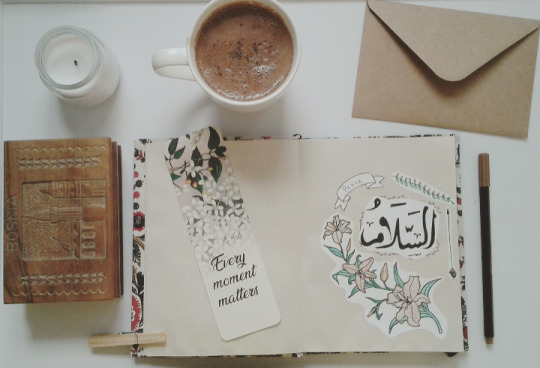
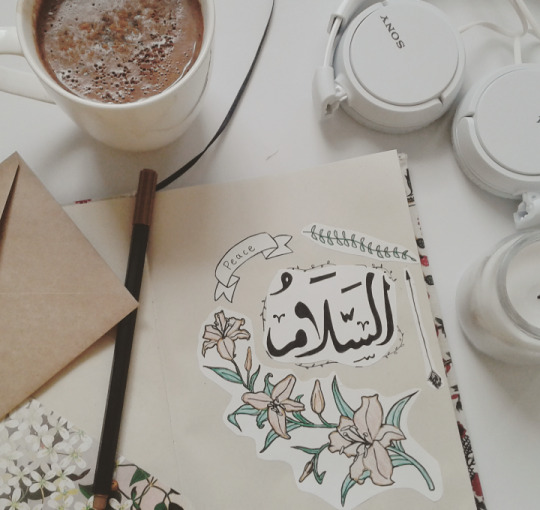
People seek inner peace in so many different ways: meditative hobbies, nature walks, and spending time with beloved friends or family, to name a few. Sometimes people gravitate towards harmful or intrepid behavior in order to escape the storm inside their hearts. One of God’s names is Al-Salam, which means “the source of peace” and “the flawless.” Because God is the ultimate source of tranquility and no one else carries this momentous title, and because we have innate flaws that disrupt our peace, our answer becomes clear. Worshipping Him, loving, trusting, and relying on Him, will give us security, warmth, and infinite filling for the hollowness of our hearts.
#loveforAllah#journaling#lovingGod#peace#aesthetic#journal#arabiccalligraphy#ninetyninenamesofAllah#ninetyninenames#Islamic#peaceatheart#chocolatemilk
2 notes
·
View notes